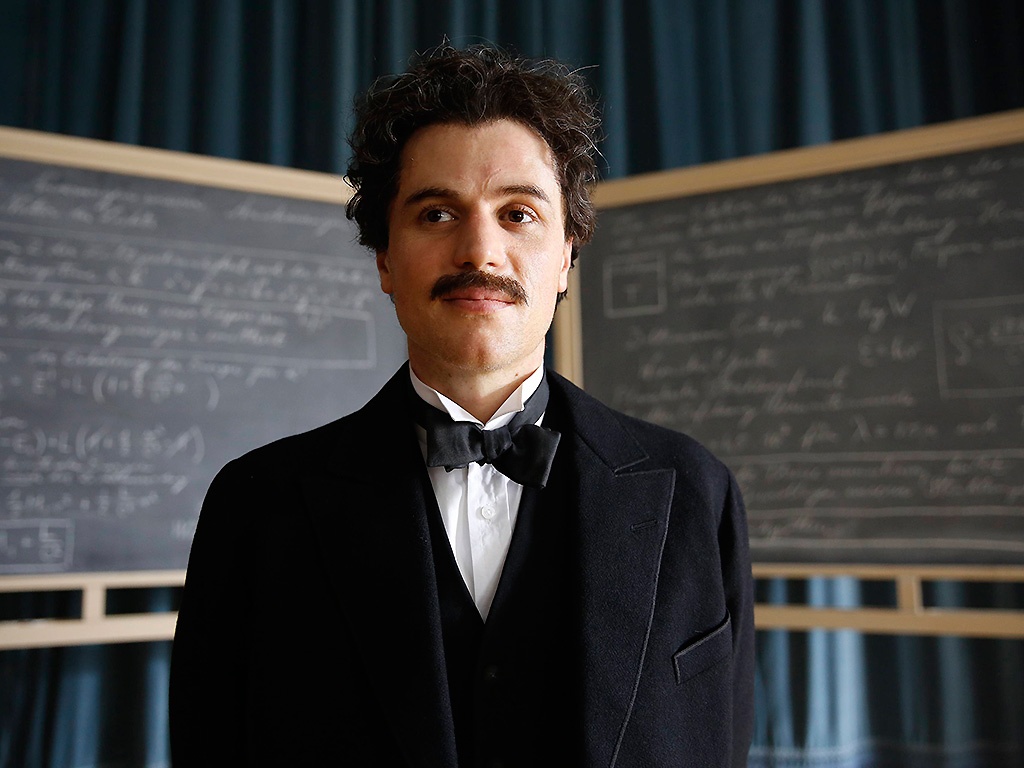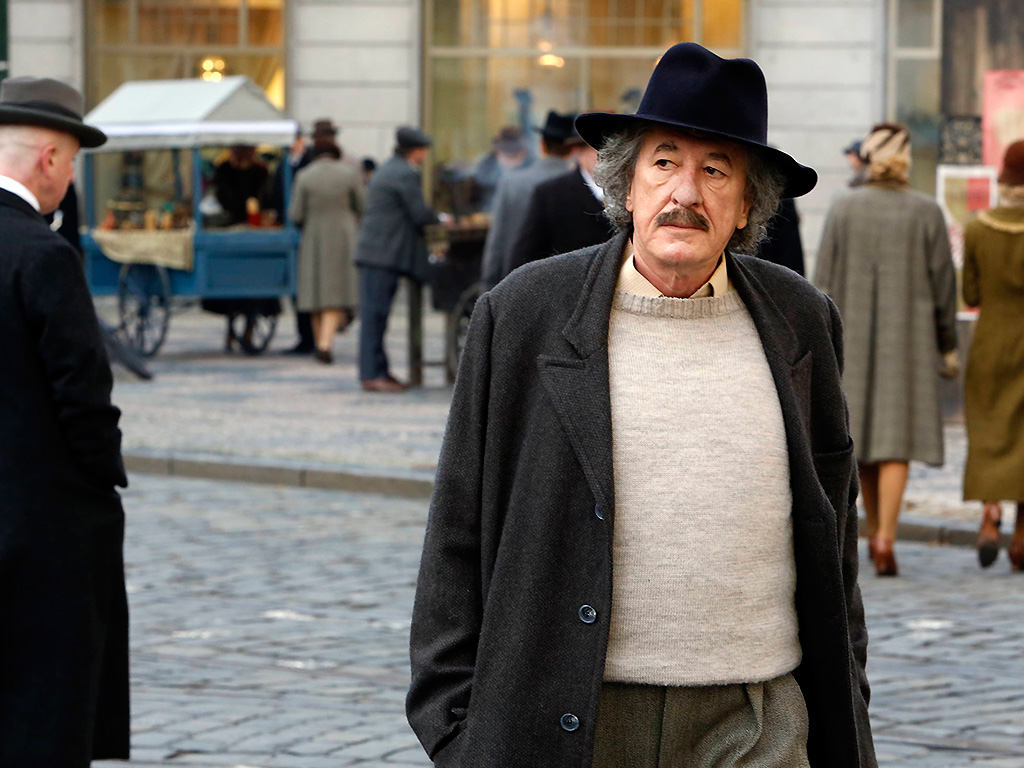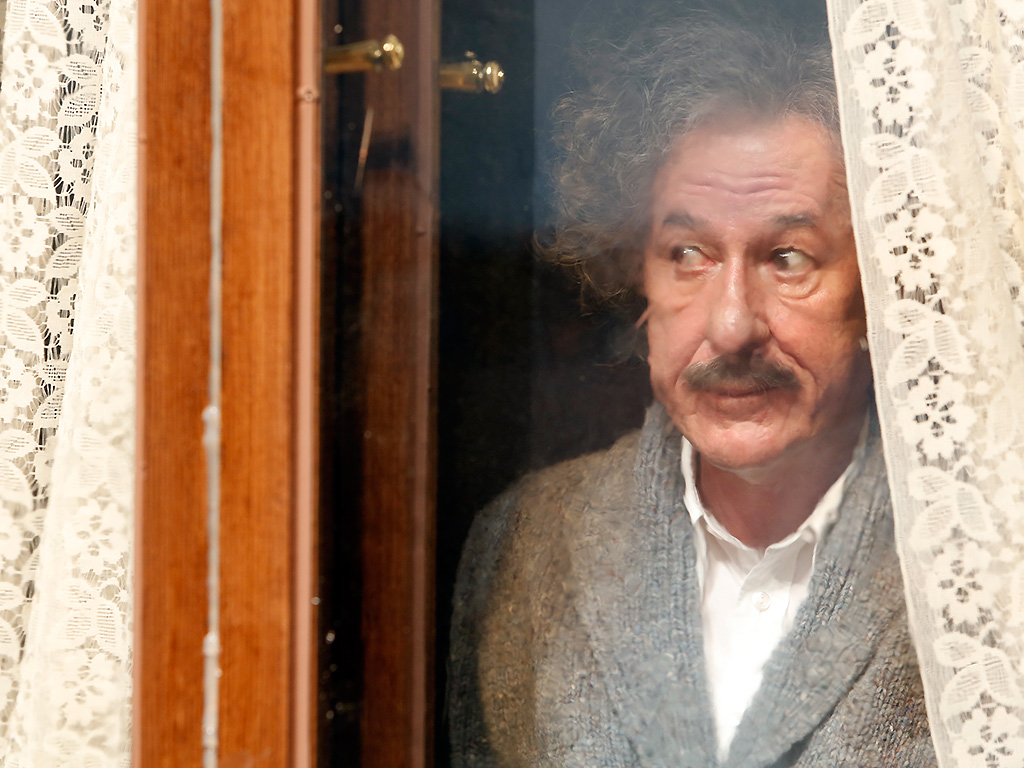So many of us know about Albert Einstein — or we like to think we know about him.

One of the most likely things to first pop into our brains when contemplating him is the iconic photo of the physicist with his tongue out and his hair frizzed, one you probably saw adorning dorm room walls in college. Or maybe you’ll think of “E = mc2” — without even really knowing what it means. Despite Einstein’s prevalence in science and pop culture at large, it seems that we don’t know many intimate details about him at all.
Thank goodness for National Geographic‘s 10-part TV series Genius, then, which follows the childhood and eventual rise of Einstein as he becomes one of the most important figures of the 20th century. Johnny Flynn (Clouds of Sils Maria) plays young Einstein, while the older, more recognizable Einstein is played by Oscar-winner Geoffrey Rush (Shine). The material was inspired by Walter Isaacson’s book, Einstein: His Life and Universe.
The science-and-nature channel is branching out with Genius, its first-ever scripted series, and with its sky-high production values, there were clearly no corners cut. If there’s any doubt of the project’s bona fides, Hollywood heavyweights Brian Grazer and Ron Howard are both executive producers on the project.
Global News chatted with Howard, Grazer and some of the cast at the winter session of the Television Critics Association in January, and got a sneak peek of the first episode. The show looks and feels like a movie, and is all-consuming right out of the gate. Here are 6 other things to know about Genius.
Ron Howard is making his TV directorial debut with Episode 1 of Genius.
Yes, that’s right. One of the greatest film directors of all time is directing a TV episode for the first time ever — and he couldn’t be more excited by the subject matter and the channel.
“I really wanted it to be a psychological study,” he continued. “And so, I felt that … we could use Einstein’s perspective on the world, and also the key people, particularly the women in his life and their perspectives of him. So, these were the two pulls that I kept working off of visually.”
Together, Flynn and Rush worked to craft the perfect Einstein.
Einstein (or, at least, our conception of Einstein) is a tough figure to embody, simply because we’ve internalized what we think we know about the physicist. Rush and Flynn actually Skyped on multiple occasions to ensure their characters melded together in the right way, and presented a unified image.
Flynn agreed that the tandem work helped them immensely in terms of forming the character.

Get breaking National news
“We did a workshop together in London, and we had the same dialect coach who was working with us,” he said. “And that, I think, was a huge help because Geoffrey had worked with her before. She was a medium for us to communicate and get a sense of this person physically and vocally, and combine our ideas and work together.”
You’ll be surprised by what you discover about the scientist.
Another executive producer on the project, Gigi Pritzker, noted the scope of the show is huge, and over the 10 episodes you’ll learn a ridiculous amount about Einstein — things you had no idea about.
“We had been working with the material for many, many years trying to fit the scope of his life into a movie, and it became very clear that just wasn’t doable, that the man had such an enormous scope of a life, not just over the amount of time, but also the things that he did,” said Pritzker. “So, there were a multitude of surprises I think that we all found, but for us, I think the biggest thing that has been so well done by Ron and Brian and the team is to understand that he is not just about the math and the physics.”
Howard agreed, saying that the complexity of the story really adds to the finished product.
This isn’t all educational. There are dramatic elements aplenty.
Some people might be deceived by the National Geographic name, but rest assured, this is a TV drama. It just so happens that the subject is a well-known scientific figure, one that melds perfectly with the channel’s other subject matter. Einstein, like all other humans, has a personal side, an emotional side — even geniuses are not exempt from human foibles.
“To see some of the things in his personal life, with him as a young man and the tragedies that he went through… these huge world events, these global events, the two World Wars and everything that was going on in Europe in the early 20th century and his personal stuff, to see the humour in the context of that is really important,” said Flynn. “That’s not what you know of him as a layman. That’s not what I knew of him before embarking on the project.”
WATCH BELOW: Honouring Albert Einstein with a world record attempt in Toronto

The supporting cast is nothing to scoff at, either.
With Emily Watson (The Theory of Everything) as Einstein’s second wife and first cousin, Elsa (yes, they were related), along with Vincent Kartheiser (Mad Men), Samantha Colley (The Crucible) and T.R. Knight (The Good Wife, Grey’s Anatomy), this is a powerhouse cast in front of the camera. Combined with the veteran crew behind the camera, they’re truly a force to be reckoned with.
The series is shot in the Czech Republic, and will feature more than just Einstein.
Filmed in Prague, the series tries to be as accurate as possible; Einstein lived and taught there during his early career.
Of course, throughout his life, Einstein met a great number of famous people. There will be many “cameos” in the series by noted scientists and other historical figures. While we’re loath to reveal them all here, some of the scientific minds featured in Genius include Marie and Pierre Curie, Carl Jung, Werner Heisenberg and Wilhelm Rontgen, among others.
‘Genius’ premieres on Tues., April 25 at 9 p.m. ET/PT on National Geographic. For non-subscribers, National Geographic is currently on free preview until May 15.











Comments